Management and Operations Report: Leadership and Operations at M&S
VerifiedAdded on 2020/11/12
|15
|4548
|297
Report
AI Summary
This report analyzes the management and operations of Marks and Spencer (M&S), a multinational retailer. It begins with an introduction to M&S, detailing its organizational structure and exploring the roles and characteristics of leaders and managers, comparing their functions and responsibilities. T...
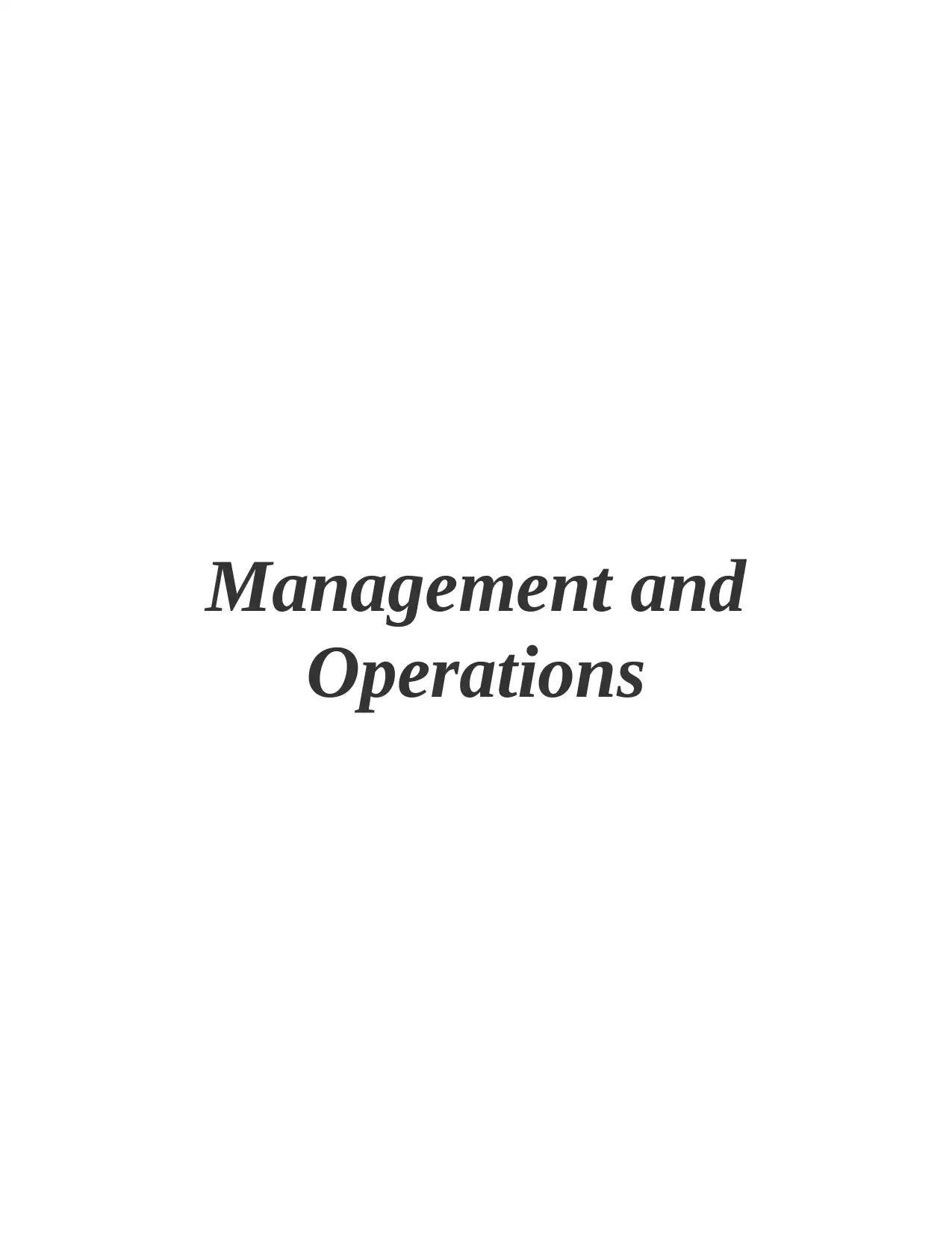
Management and
Operations
Operations
Paraphrase This Document
Need a fresh take? Get an instant paraphrase of this document with our AI Paraphraser
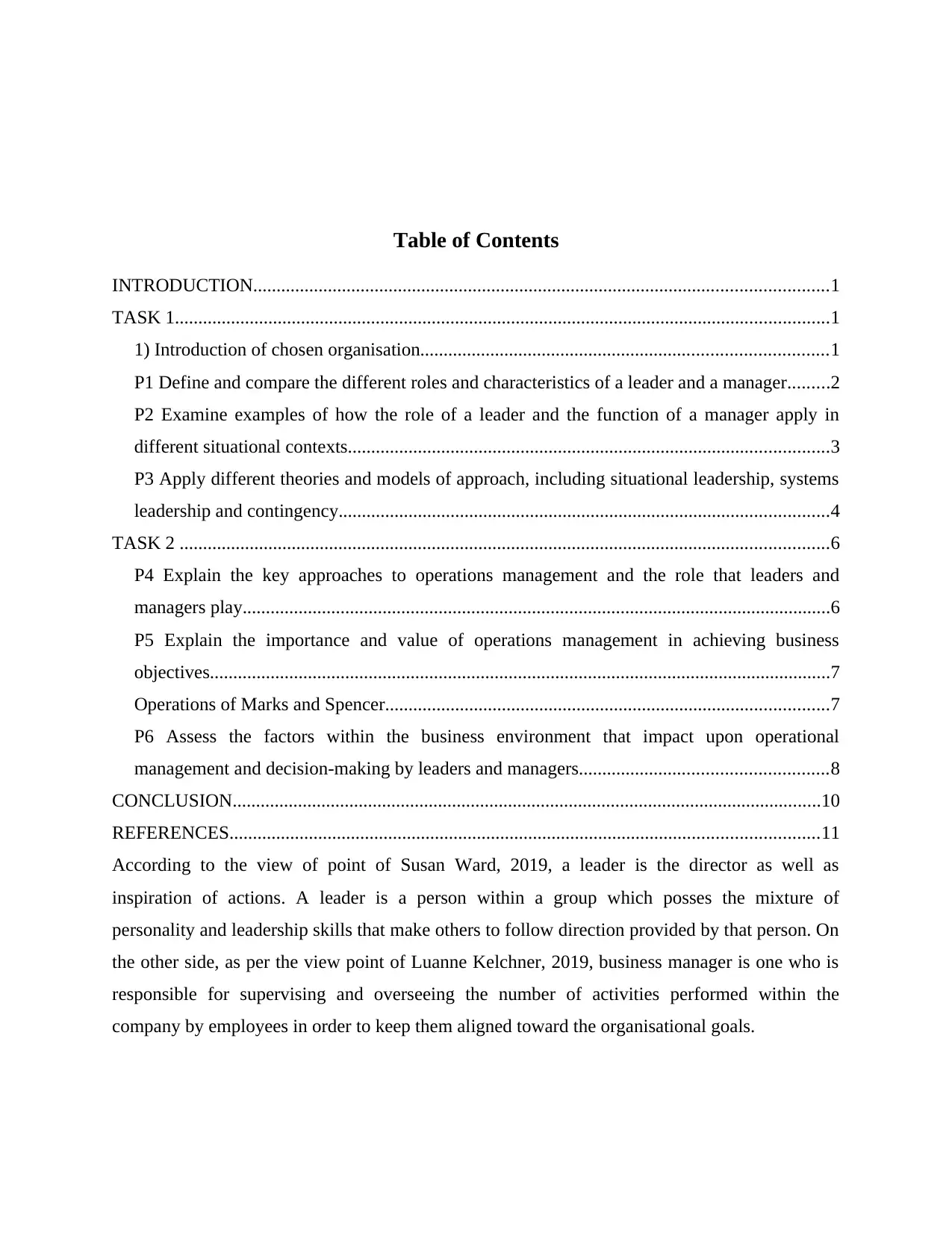
Table of Contents
INTRODUCTION...........................................................................................................................1
TASK 1............................................................................................................................................1
1) Introduction of chosen organisation.......................................................................................1
P1 Define and compare the different roles and characteristics of a leader and a manager.........2
P2 Examine examples of how the role of a leader and the function of a manager apply in
different situational contexts.......................................................................................................3
P3 Apply different theories and models of approach, including situational leadership, systems
leadership and contingency.........................................................................................................4
TASK 2 ...........................................................................................................................................6
P4 Explain the key approaches to operations management and the role that leaders and
managers play..............................................................................................................................6
P5 Explain the importance and value of operations management in achieving business
objectives.....................................................................................................................................7
Operations of Marks and Spencer...............................................................................................7
P6 Assess the factors within the business environment that impact upon operational
management and decision-making by leaders and managers.....................................................8
CONCLUSION..............................................................................................................................10
REFERENCES..............................................................................................................................11
According to the view of point of Susan Ward, 2019, a leader is the director as well as
inspiration of actions. A leader is a person within a group which posses the mixture of
personality and leadership skills that make others to follow direction provided by that person. On
the other side, as per the view point of Luanne Kelchner, 2019, business manager is one who is
responsible for supervising and overseeing the number of activities performed within the
company by employees in order to keep them aligned toward the organisational goals.
INTRODUCTION...........................................................................................................................1
TASK 1............................................................................................................................................1
1) Introduction of chosen organisation.......................................................................................1
P1 Define and compare the different roles and characteristics of a leader and a manager.........2
P2 Examine examples of how the role of a leader and the function of a manager apply in
different situational contexts.......................................................................................................3
P3 Apply different theories and models of approach, including situational leadership, systems
leadership and contingency.........................................................................................................4
TASK 2 ...........................................................................................................................................6
P4 Explain the key approaches to operations management and the role that leaders and
managers play..............................................................................................................................6
P5 Explain the importance and value of operations management in achieving business
objectives.....................................................................................................................................7
Operations of Marks and Spencer...............................................................................................7
P6 Assess the factors within the business environment that impact upon operational
management and decision-making by leaders and managers.....................................................8
CONCLUSION..............................................................................................................................10
REFERENCES..............................................................................................................................11
According to the view of point of Susan Ward, 2019, a leader is the director as well as
inspiration of actions. A leader is a person within a group which posses the mixture of
personality and leadership skills that make others to follow direction provided by that person. On
the other side, as per the view point of Luanne Kelchner, 2019, business manager is one who is
responsible for supervising and overseeing the number of activities performed within the
company by employees in order to keep them aligned toward the organisational goals.

⊘ This is a preview!⊘
Do you want full access?
Subscribe today to unlock all pages.

Trusted by 1+ million students worldwide
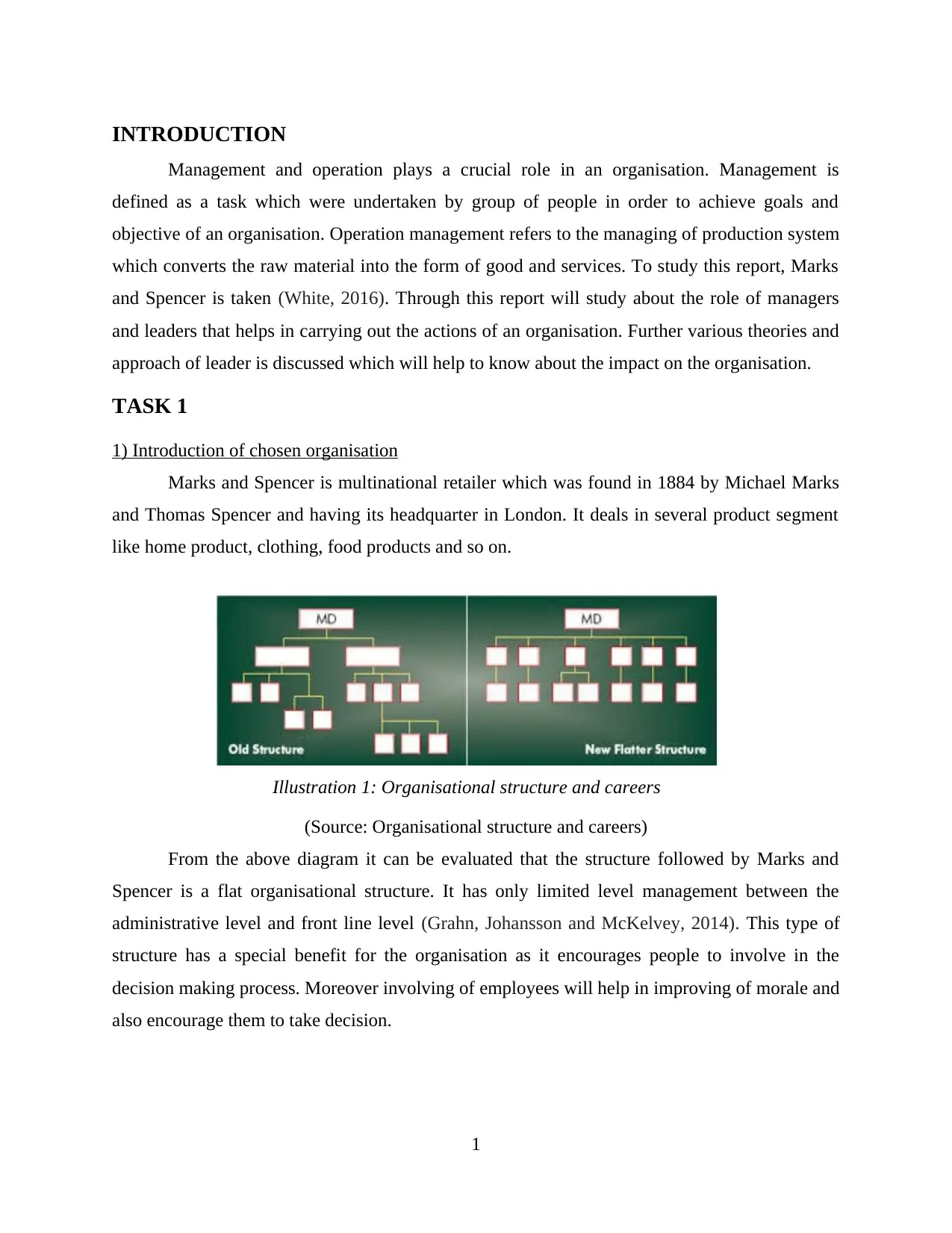
INTRODUCTION
Management and operation plays a crucial role in an organisation. Management is
defined as a task which were undertaken by group of people in order to achieve goals and
objective of an organisation. Operation management refers to the managing of production system
which converts the raw material into the form of good and services. To study this report, Marks
and Spencer is taken (White, 2016). Through this report will study about the role of managers
and leaders that helps in carrying out the actions of an organisation. Further various theories and
approach of leader is discussed which will help to know about the impact on the organisation.
TASK 1
1) Introduction of chosen organisation
Marks and Spencer is multinational retailer which was found in 1884 by Michael Marks
and Thomas Spencer and having its headquarter in London. It deals in several product segment
like home product, clothing, food products and so on.
(Source: Organisational structure and careers)
From the above diagram it can be evaluated that the structure followed by Marks and
Spencer is a flat organisational structure. It has only limited level management between the
administrative level and front line level (Grahn, Johansson and McKelvey, 2014). This type of
structure has a special benefit for the organisation as it encourages people to involve in the
decision making process. Moreover involving of employees will help in improving of morale and
also encourage them to take decision.
1
Illustration 1: Organisational structure and careers
Management and operation plays a crucial role in an organisation. Management is
defined as a task which were undertaken by group of people in order to achieve goals and
objective of an organisation. Operation management refers to the managing of production system
which converts the raw material into the form of good and services. To study this report, Marks
and Spencer is taken (White, 2016). Through this report will study about the role of managers
and leaders that helps in carrying out the actions of an organisation. Further various theories and
approach of leader is discussed which will help to know about the impact on the organisation.
TASK 1
1) Introduction of chosen organisation
Marks and Spencer is multinational retailer which was found in 1884 by Michael Marks
and Thomas Spencer and having its headquarter in London. It deals in several product segment
like home product, clothing, food products and so on.
(Source: Organisational structure and careers)
From the above diagram it can be evaluated that the structure followed by Marks and
Spencer is a flat organisational structure. It has only limited level management between the
administrative level and front line level (Grahn, Johansson and McKelvey, 2014). This type of
structure has a special benefit for the organisation as it encourages people to involve in the
decision making process. Moreover involving of employees will help in improving of morale and
also encourage them to take decision.
1
Illustration 1: Organisational structure and careers
Paraphrase This Document
Need a fresh take? Get an instant paraphrase of this document with our AI Paraphraser
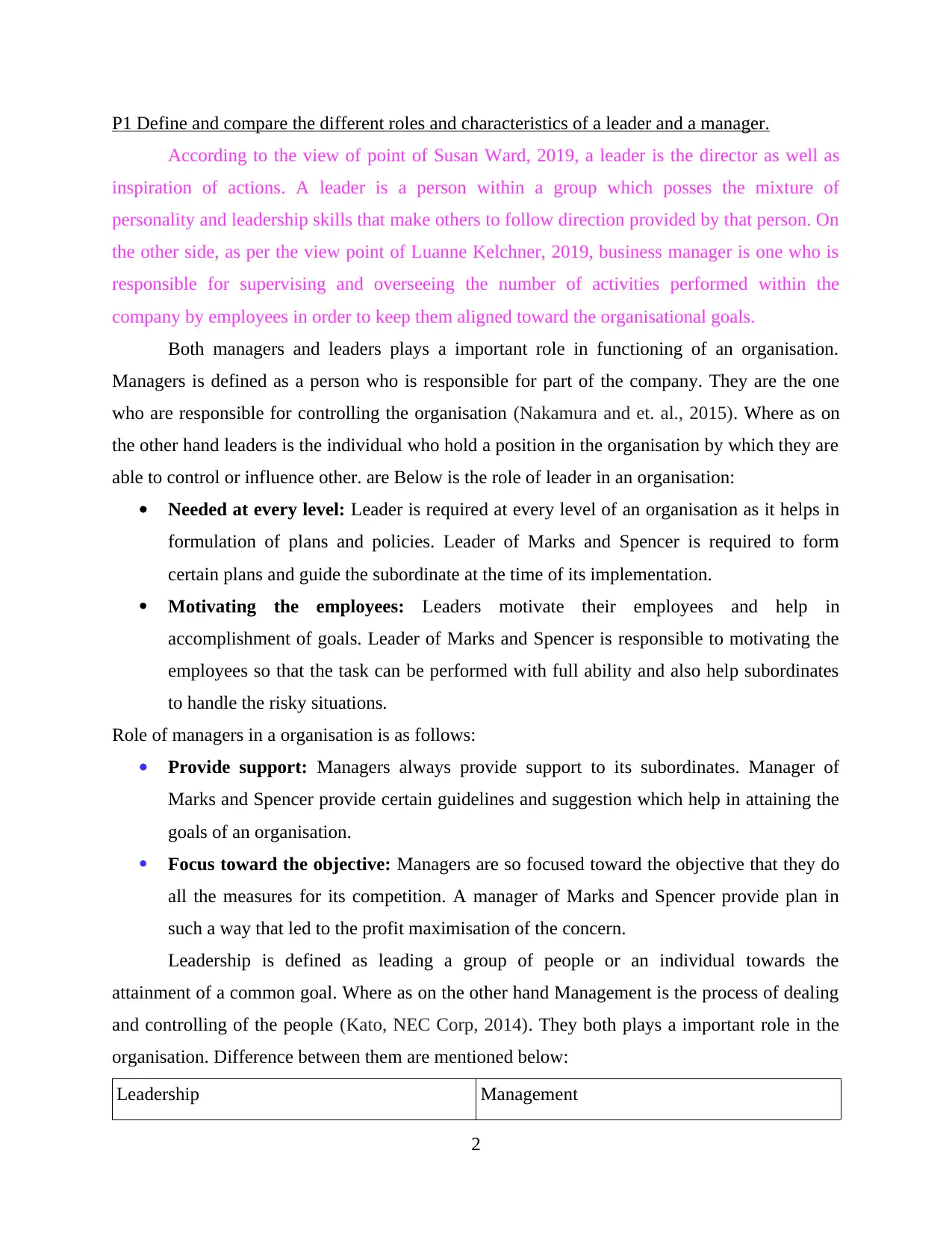
P1 Define and compare the different roles and characteristics of a leader and a manager.
According to the view of point of Susan Ward, 2019, a leader is the director as well as
inspiration of actions. A leader is a person within a group which posses the mixture of
personality and leadership skills that make others to follow direction provided by that person. On
the other side, as per the view point of Luanne Kelchner, 2019, business manager is one who is
responsible for supervising and overseeing the number of activities performed within the
company by employees in order to keep them aligned toward the organisational goals.
Both managers and leaders plays a important role in functioning of an organisation.
Managers is defined as a person who is responsible for part of the company. They are the one
who are responsible for controlling the organisation (Nakamura and et. al., 2015). Where as on
the other hand leaders is the individual who hold a position in the organisation by which they are
able to control or influence other. are Below is the role of leader in an organisation:
Needed at every level: Leader is required at every level of an organisation as it helps in
formulation of plans and policies. Leader of Marks and Spencer is required to form
certain plans and guide the subordinate at the time of its implementation.
Motivating the employees: Leaders motivate their employees and help in
accomplishment of goals. Leader of Marks and Spencer is responsible to motivating the
employees so that the task can be performed with full ability and also help subordinates
to handle the risky situations.
Role of managers in a organisation is as follows:
Provide support: Managers always provide support to its subordinates. Manager of
Marks and Spencer provide certain guidelines and suggestion which help in attaining the
goals of an organisation.
Focus toward the objective: Managers are so focused toward the objective that they do
all the measures for its competition. A manager of Marks and Spencer provide plan in
such a way that led to the profit maximisation of the concern.
Leadership is defined as leading a group of people or an individual towards the
attainment of a common goal. Where as on the other hand Management is the process of dealing
and controlling of the people (Kato, NEC Corp, 2014). They both plays a important role in the
organisation. Difference between them are mentioned below:
Leadership Management
2
According to the view of point of Susan Ward, 2019, a leader is the director as well as
inspiration of actions. A leader is a person within a group which posses the mixture of
personality and leadership skills that make others to follow direction provided by that person. On
the other side, as per the view point of Luanne Kelchner, 2019, business manager is one who is
responsible for supervising and overseeing the number of activities performed within the
company by employees in order to keep them aligned toward the organisational goals.
Both managers and leaders plays a important role in functioning of an organisation.
Managers is defined as a person who is responsible for part of the company. They are the one
who are responsible for controlling the organisation (Nakamura and et. al., 2015). Where as on
the other hand leaders is the individual who hold a position in the organisation by which they are
able to control or influence other. are Below is the role of leader in an organisation:
Needed at every level: Leader is required at every level of an organisation as it helps in
formulation of plans and policies. Leader of Marks and Spencer is required to form
certain plans and guide the subordinate at the time of its implementation.
Motivating the employees: Leaders motivate their employees and help in
accomplishment of goals. Leader of Marks and Spencer is responsible to motivating the
employees so that the task can be performed with full ability and also help subordinates
to handle the risky situations.
Role of managers in a organisation is as follows:
Provide support: Managers always provide support to its subordinates. Manager of
Marks and Spencer provide certain guidelines and suggestion which help in attaining the
goals of an organisation.
Focus toward the objective: Managers are so focused toward the objective that they do
all the measures for its competition. A manager of Marks and Spencer provide plan in
such a way that led to the profit maximisation of the concern.
Leadership is defined as leading a group of people or an individual towards the
attainment of a common goal. Where as on the other hand Management is the process of dealing
and controlling of the people (Kato, NEC Corp, 2014). They both plays a important role in the
organisation. Difference between them are mentioned below:
Leadership Management
2

There main focus is on listening,
building of relations, inspiring of team
work and motivating of the
subordinates.
Leadership only check the potential and
capabilities of individual because it
deal with future performance.
There main focus is on planning,
organising, directing and controlling.
Management values the employees by
their previous performance and
comparing the same with the present
performance.
P2 Examine examples of how the role of a leader and the function of a manager apply in
different situational contexts.
Role of leader and manager differs according to the situation. Various situation of Marks and
Spencer are explained below:
Fast situation: In this type of situation changes take place very rapidly. This situation
occurs when number of competitors are very high in the market. The competitors of
M&S are Asda, Tesco etc. In such type of situation it is very difficult for managers to
take decision regarding the organisation. Leaders too didn't have time to discuss with
subordinates (Shabanpour-Haghighi and Seifi, 2015). Thus the decision taken here by the
M&S are autocratic. To cope up with such situation proper task should be delegated to
the employees.
Slow situation: In this type of situation changes take place slowly. They normally arise
because of change in the taste and preference of people. Thus the decision taken here by
M&S is democratic. The company has plenty of time to ask about the subordinate about
the views which helps them in effective decision.
Steady situation: In this type of situation, changes are taking place but it didn't affect the
functioning of an organisation. In such type of situation leaders and managers of M&S
are not able to motivate their employees to perform better as they are not habitual of any
situations.
Role of a leader and manager in dealing with different situation.
Slow situation: This situation can be overcome by a manager by effectively utilising
resources so that productivity of employees could be improved. A leader can overcome
3
building of relations, inspiring of team
work and motivating of the
subordinates.
Leadership only check the potential and
capabilities of individual because it
deal with future performance.
There main focus is on planning,
organising, directing and controlling.
Management values the employees by
their previous performance and
comparing the same with the present
performance.
P2 Examine examples of how the role of a leader and the function of a manager apply in
different situational contexts.
Role of leader and manager differs according to the situation. Various situation of Marks and
Spencer are explained below:
Fast situation: In this type of situation changes take place very rapidly. This situation
occurs when number of competitors are very high in the market. The competitors of
M&S are Asda, Tesco etc. In such type of situation it is very difficult for managers to
take decision regarding the organisation. Leaders too didn't have time to discuss with
subordinates (Shabanpour-Haghighi and Seifi, 2015). Thus the decision taken here by the
M&S are autocratic. To cope up with such situation proper task should be delegated to
the employees.
Slow situation: In this type of situation changes take place slowly. They normally arise
because of change in the taste and preference of people. Thus the decision taken here by
M&S is democratic. The company has plenty of time to ask about the subordinate about
the views which helps them in effective decision.
Steady situation: In this type of situation, changes are taking place but it didn't affect the
functioning of an organisation. In such type of situation leaders and managers of M&S
are not able to motivate their employees to perform better as they are not habitual of any
situations.
Role of a leader and manager in dealing with different situation.
Slow situation: This situation can be overcome by a manager by effectively utilising
resources so that productivity of employees could be improved. A leader can overcome
3
⊘ This is a preview!⊘
Do you want full access?
Subscribe today to unlock all pages.

Trusted by 1+ million students worldwide
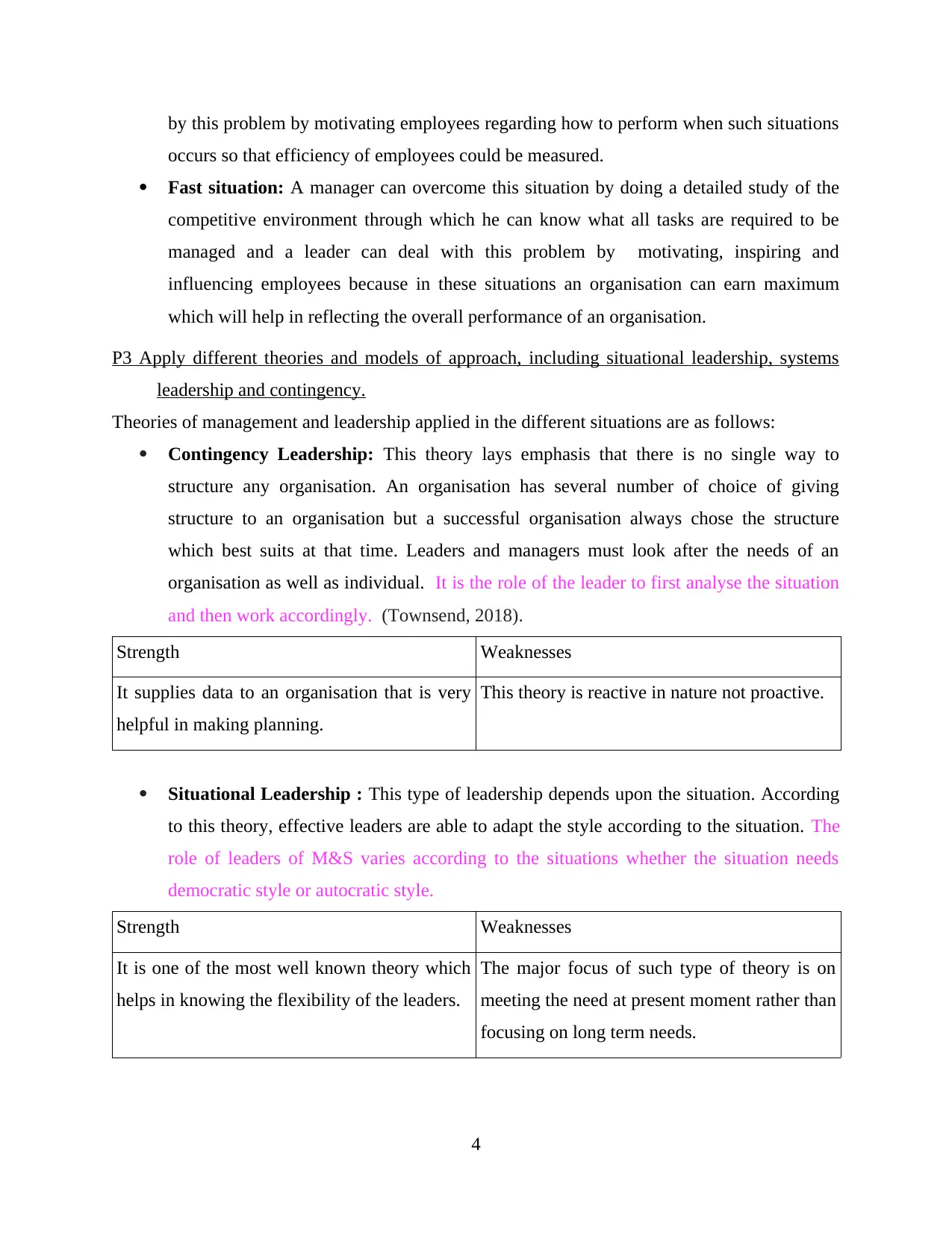
by this problem by motivating employees regarding how to perform when such situations
occurs so that efficiency of employees could be measured.
Fast situation: A manager can overcome this situation by doing a detailed study of the
competitive environment through which he can know what all tasks are required to be
managed and a leader can deal with this problem by motivating, inspiring and
influencing employees because in these situations an organisation can earn maximum
which will help in reflecting the overall performance of an organisation.
P3 Apply different theories and models of approach, including situational leadership, systems
leadership and contingency.
Theories of management and leadership applied in the different situations are as follows:
Contingency Leadership: This theory lays emphasis that there is no single way to
structure any organisation. An organisation has several number of choice of giving
structure to an organisation but a successful organisation always chose the structure
which best suits at that time. Leaders and managers must look after the needs of an
organisation as well as individual. It is the role of the leader to first analyse the situation
and then work accordingly. (Townsend, 2018).
Strength Weaknesses
It supplies data to an organisation that is very
helpful in making planning.
This theory is reactive in nature not proactive.
Situational Leadership : This type of leadership depends upon the situation. According
to this theory, effective leaders are able to adapt the style according to the situation. The
role of leaders of M&S varies according to the situations whether the situation needs
democratic style or autocratic style.
Strength Weaknesses
It is one of the most well known theory which
helps in knowing the flexibility of the leaders.
The major focus of such type of theory is on
meeting the need at present moment rather than
focusing on long term needs.
4
occurs so that efficiency of employees could be measured.
Fast situation: A manager can overcome this situation by doing a detailed study of the
competitive environment through which he can know what all tasks are required to be
managed and a leader can deal with this problem by motivating, inspiring and
influencing employees because in these situations an organisation can earn maximum
which will help in reflecting the overall performance of an organisation.
P3 Apply different theories and models of approach, including situational leadership, systems
leadership and contingency.
Theories of management and leadership applied in the different situations are as follows:
Contingency Leadership: This theory lays emphasis that there is no single way to
structure any organisation. An organisation has several number of choice of giving
structure to an organisation but a successful organisation always chose the structure
which best suits at that time. Leaders and managers must look after the needs of an
organisation as well as individual. It is the role of the leader to first analyse the situation
and then work accordingly. (Townsend, 2018).
Strength Weaknesses
It supplies data to an organisation that is very
helpful in making planning.
This theory is reactive in nature not proactive.
Situational Leadership : This type of leadership depends upon the situation. According
to this theory, effective leaders are able to adapt the style according to the situation. The
role of leaders of M&S varies according to the situations whether the situation needs
democratic style or autocratic style.
Strength Weaknesses
It is one of the most well known theory which
helps in knowing the flexibility of the leaders.
The major focus of such type of theory is on
meeting the need at present moment rather than
focusing on long term needs.
4
Paraphrase This Document
Need a fresh take? Get an instant paraphrase of this document with our AI Paraphraser
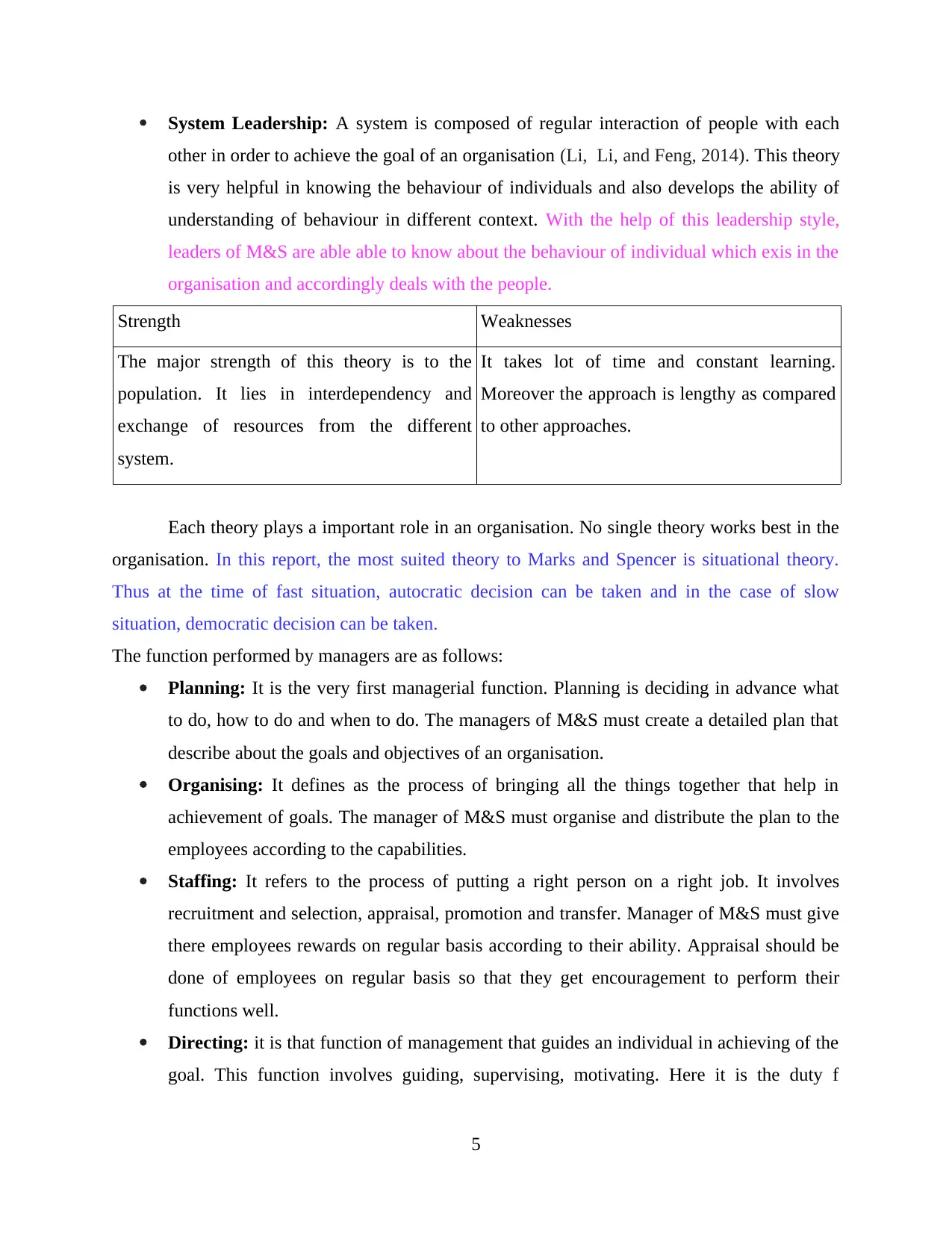
System Leadership: A system is composed of regular interaction of people with each
other in order to achieve the goal of an organisation (Li, Li, and Feng, 2014). This theory
is very helpful in knowing the behaviour of individuals and also develops the ability of
understanding of behaviour in different context. With the help of this leadership style,
leaders of M&S are able able to know about the behaviour of individual which exis in the
organisation and accordingly deals with the people.
Strength Weaknesses
The major strength of this theory is to the
population. It lies in interdependency and
exchange of resources from the different
system.
It takes lot of time and constant learning.
Moreover the approach is lengthy as compared
to other approaches.
Each theory plays a important role in an organisation. No single theory works best in the
organisation. In this report, the most suited theory to Marks and Spencer is situational theory.
Thus at the time of fast situation, autocratic decision can be taken and in the case of slow
situation, democratic decision can be taken.
The function performed by managers are as follows:
Planning: It is the very first managerial function. Planning is deciding in advance what
to do, how to do and when to do. The managers of M&S must create a detailed plan that
describe about the goals and objectives of an organisation.
Organising: It defines as the process of bringing all the things together that help in
achievement of goals. The manager of M&S must organise and distribute the plan to the
employees according to the capabilities.
Staffing: It refers to the process of putting a right person on a right job. It involves
recruitment and selection, appraisal, promotion and transfer. Manager of M&S must give
there employees rewards on regular basis according to their ability. Appraisal should be
done of employees on regular basis so that they get encouragement to perform their
functions well.
Directing: it is that function of management that guides an individual in achieving of the
goal. This function involves guiding, supervising, motivating. Here it is the duty f
5
other in order to achieve the goal of an organisation (Li, Li, and Feng, 2014). This theory
is very helpful in knowing the behaviour of individuals and also develops the ability of
understanding of behaviour in different context. With the help of this leadership style,
leaders of M&S are able able to know about the behaviour of individual which exis in the
organisation and accordingly deals with the people.
Strength Weaknesses
The major strength of this theory is to the
population. It lies in interdependency and
exchange of resources from the different
system.
It takes lot of time and constant learning.
Moreover the approach is lengthy as compared
to other approaches.
Each theory plays a important role in an organisation. No single theory works best in the
organisation. In this report, the most suited theory to Marks and Spencer is situational theory.
Thus at the time of fast situation, autocratic decision can be taken and in the case of slow
situation, democratic decision can be taken.
The function performed by managers are as follows:
Planning: It is the very first managerial function. Planning is deciding in advance what
to do, how to do and when to do. The managers of M&S must create a detailed plan that
describe about the goals and objectives of an organisation.
Organising: It defines as the process of bringing all the things together that help in
achievement of goals. The manager of M&S must organise and distribute the plan to the
employees according to the capabilities.
Staffing: It refers to the process of putting a right person on a right job. It involves
recruitment and selection, appraisal, promotion and transfer. Manager of M&S must give
there employees rewards on regular basis according to their ability. Appraisal should be
done of employees on regular basis so that they get encouragement to perform their
functions well.
Directing: it is that function of management that guides an individual in achieving of the
goal. This function involves guiding, supervising, motivating. Here it is the duty f
5
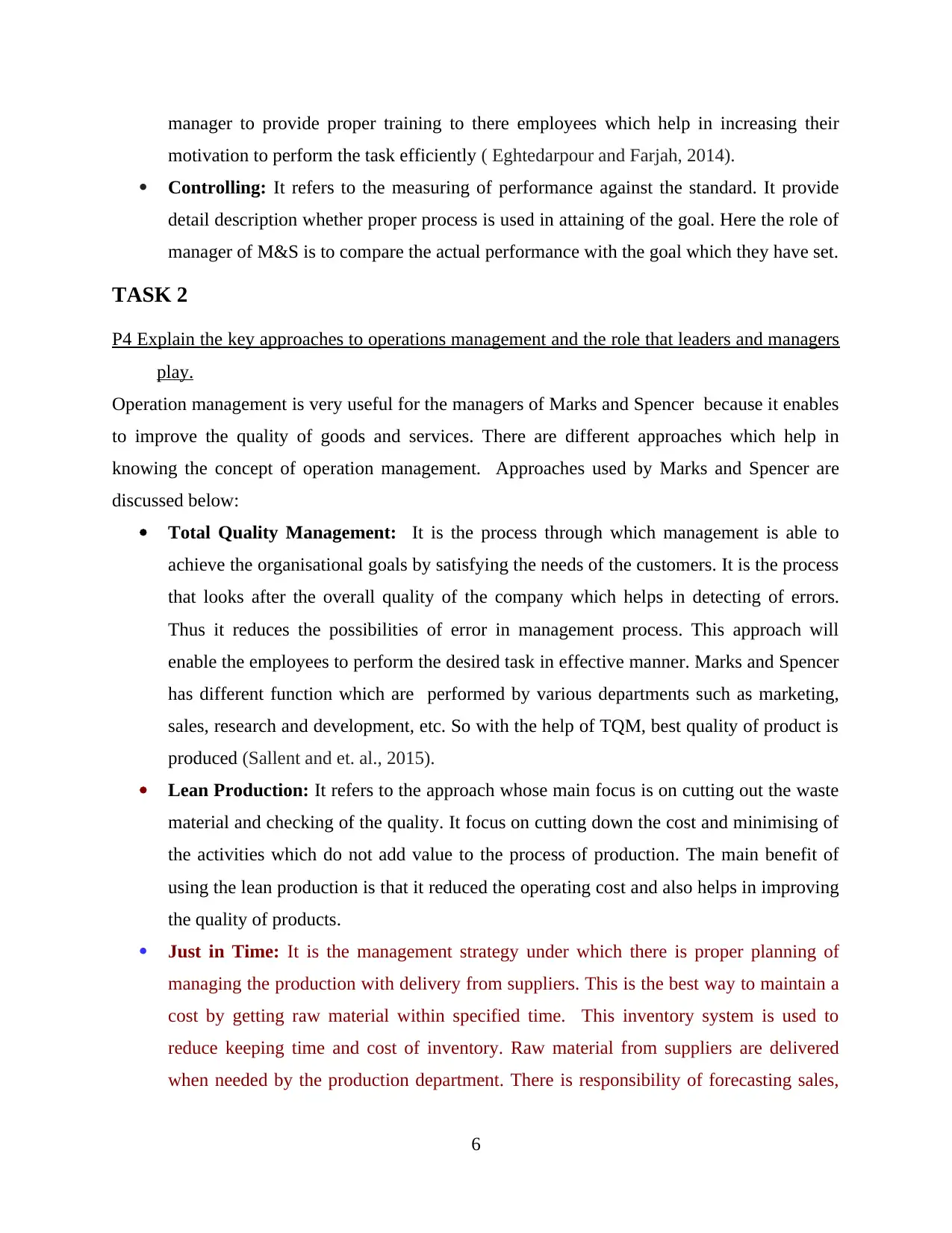
manager to provide proper training to there employees which help in increasing their
motivation to perform the task efficiently ( Eghtedarpour and Farjah, 2014).
Controlling: It refers to the measuring of performance against the standard. It provide
detail description whether proper process is used in attaining of the goal. Here the role of
manager of M&S is to compare the actual performance with the goal which they have set.
TASK 2
P4 Explain the key approaches to operations management and the role that leaders and managers
play.
Operation management is very useful for the managers of Marks and Spencer because it enables
to improve the quality of goods and services. There are different approaches which help in
knowing the concept of operation management. Approaches used by Marks and Spencer are
discussed below:
Total Quality Management: It is the process through which management is able to
achieve the organisational goals by satisfying the needs of the customers. It is the process
that looks after the overall quality of the company which helps in detecting of errors.
Thus it reduces the possibilities of error in management process. This approach will
enable the employees to perform the desired task in effective manner. Marks and Spencer
has different function which are performed by various departments such as marketing,
sales, research and development, etc. So with the help of TQM, best quality of product is
produced (Sallent and et. al., 2015).
Lean Production: It refers to the approach whose main focus is on cutting out the waste
material and checking of the quality. It focus on cutting down the cost and minimising of
the activities which do not add value to the process of production. The main benefit of
using the lean production is that it reduced the operating cost and also helps in improving
the quality of products.
Just in Time: It is the management strategy under which there is proper planning of
managing the production with delivery from suppliers. This is the best way to maintain a
cost by getting raw material within specified time. This inventory system is used to
reduce keeping time and cost of inventory. Raw material from suppliers are delivered
when needed by the production department. There is responsibility of forecasting sales,
6
motivation to perform the task efficiently ( Eghtedarpour and Farjah, 2014).
Controlling: It refers to the measuring of performance against the standard. It provide
detail description whether proper process is used in attaining of the goal. Here the role of
manager of M&S is to compare the actual performance with the goal which they have set.
TASK 2
P4 Explain the key approaches to operations management and the role that leaders and managers
play.
Operation management is very useful for the managers of Marks and Spencer because it enables
to improve the quality of goods and services. There are different approaches which help in
knowing the concept of operation management. Approaches used by Marks and Spencer are
discussed below:
Total Quality Management: It is the process through which management is able to
achieve the organisational goals by satisfying the needs of the customers. It is the process
that looks after the overall quality of the company which helps in detecting of errors.
Thus it reduces the possibilities of error in management process. This approach will
enable the employees to perform the desired task in effective manner. Marks and Spencer
has different function which are performed by various departments such as marketing,
sales, research and development, etc. So with the help of TQM, best quality of product is
produced (Sallent and et. al., 2015).
Lean Production: It refers to the approach whose main focus is on cutting out the waste
material and checking of the quality. It focus on cutting down the cost and minimising of
the activities which do not add value to the process of production. The main benefit of
using the lean production is that it reduced the operating cost and also helps in improving
the quality of products.
Just in Time: It is the management strategy under which there is proper planning of
managing the production with delivery from suppliers. This is the best way to maintain a
cost by getting raw material within specified time. This inventory system is used to
reduce keeping time and cost of inventory. Raw material from suppliers are delivered
when needed by the production department. There is responsibility of forecasting sales,
6
⊘ This is a preview!⊘
Do you want full access?
Subscribe today to unlock all pages.

Trusted by 1+ million students worldwide
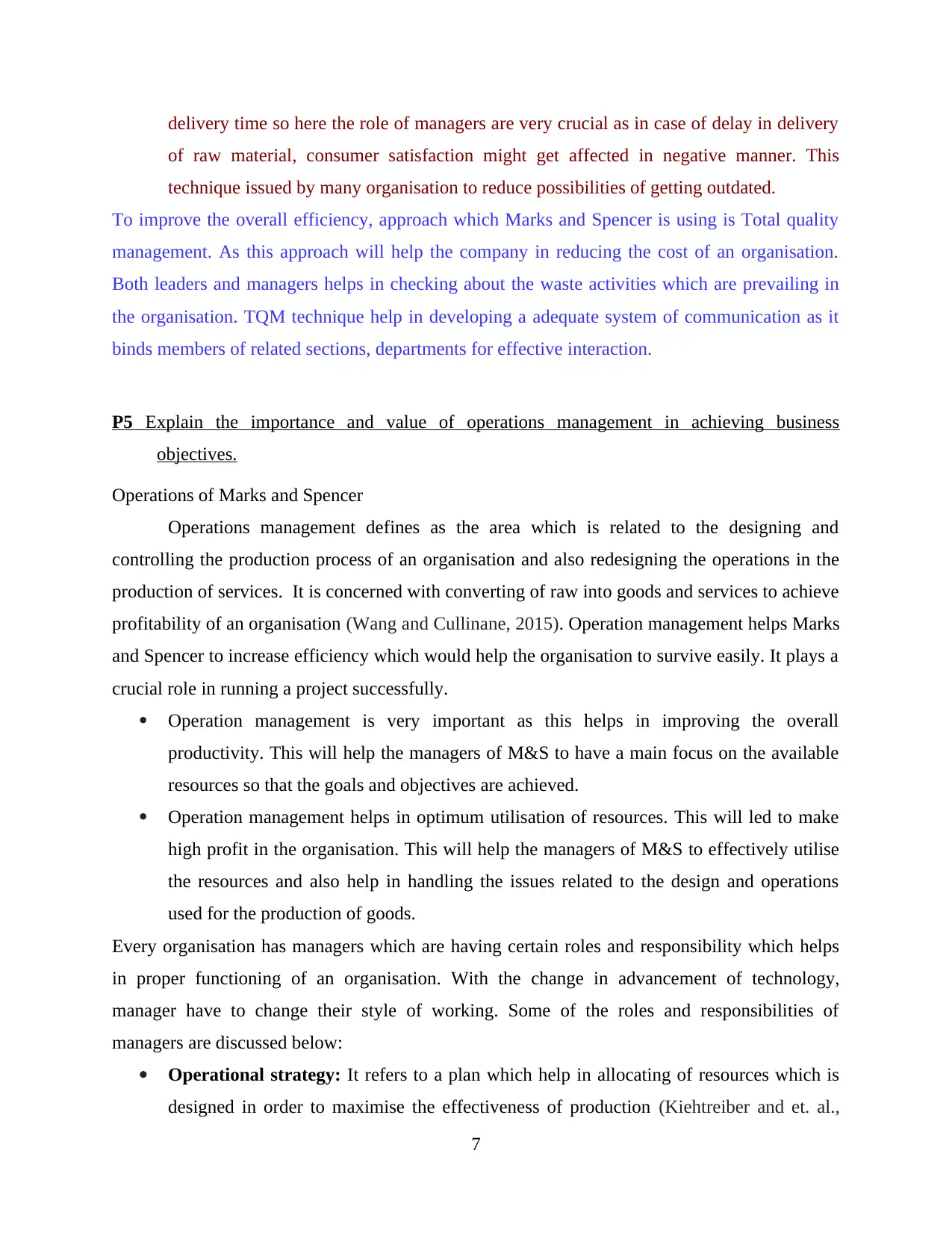
delivery time so here the role of managers are very crucial as in case of delay in delivery
of raw material, consumer satisfaction might get affected in negative manner. This
technique issued by many organisation to reduce possibilities of getting outdated.
To improve the overall efficiency, approach which Marks and Spencer is using is Total quality
management. As this approach will help the company in reducing the cost of an organisation.
Both leaders and managers helps in checking about the waste activities which are prevailing in
the organisation. TQM technique help in developing a adequate system of communication as it
binds members of related sections, departments for effective interaction.
P5 Explain the importance and value of operations management in achieving business
objectives.
Operations of Marks and Spencer
Operations management defines as the area which is related to the designing and
controlling the production process of an organisation and also redesigning the operations in the
production of services. It is concerned with converting of raw into goods and services to achieve
profitability of an organisation (Wang and Cullinane, 2015). Operation management helps Marks
and Spencer to increase efficiency which would help the organisation to survive easily. It plays a
crucial role in running a project successfully.
Operation management is very important as this helps in improving the overall
productivity. This will help the managers of M&S to have a main focus on the available
resources so that the goals and objectives are achieved.
Operation management helps in optimum utilisation of resources. This will led to make
high profit in the organisation. This will help the managers of M&S to effectively utilise
the resources and also help in handling the issues related to the design and operations
used for the production of goods.
Every organisation has managers which are having certain roles and responsibility which helps
in proper functioning of an organisation. With the change in advancement of technology,
manager have to change their style of working. Some of the roles and responsibilities of
managers are discussed below:
Operational strategy: It refers to a plan which help in allocating of resources which is
designed in order to maximise the effectiveness of production (Kiehtreiber and et. al.,
7
of raw material, consumer satisfaction might get affected in negative manner. This
technique issued by many organisation to reduce possibilities of getting outdated.
To improve the overall efficiency, approach which Marks and Spencer is using is Total quality
management. As this approach will help the company in reducing the cost of an organisation.
Both leaders and managers helps in checking about the waste activities which are prevailing in
the organisation. TQM technique help in developing a adequate system of communication as it
binds members of related sections, departments for effective interaction.
P5 Explain the importance and value of operations management in achieving business
objectives.
Operations of Marks and Spencer
Operations management defines as the area which is related to the designing and
controlling the production process of an organisation and also redesigning the operations in the
production of services. It is concerned with converting of raw into goods and services to achieve
profitability of an organisation (Wang and Cullinane, 2015). Operation management helps Marks
and Spencer to increase efficiency which would help the organisation to survive easily. It plays a
crucial role in running a project successfully.
Operation management is very important as this helps in improving the overall
productivity. This will help the managers of M&S to have a main focus on the available
resources so that the goals and objectives are achieved.
Operation management helps in optimum utilisation of resources. This will led to make
high profit in the organisation. This will help the managers of M&S to effectively utilise
the resources and also help in handling the issues related to the design and operations
used for the production of goods.
Every organisation has managers which are having certain roles and responsibility which helps
in proper functioning of an organisation. With the change in advancement of technology,
manager have to change their style of working. Some of the roles and responsibilities of
managers are discussed below:
Operational strategy: It refers to a plan which help in allocating of resources which is
designed in order to maximise the effectiveness of production (Kiehtreiber and et. al.,
7
Paraphrase This Document
Need a fresh take? Get an instant paraphrase of this document with our AI Paraphraser
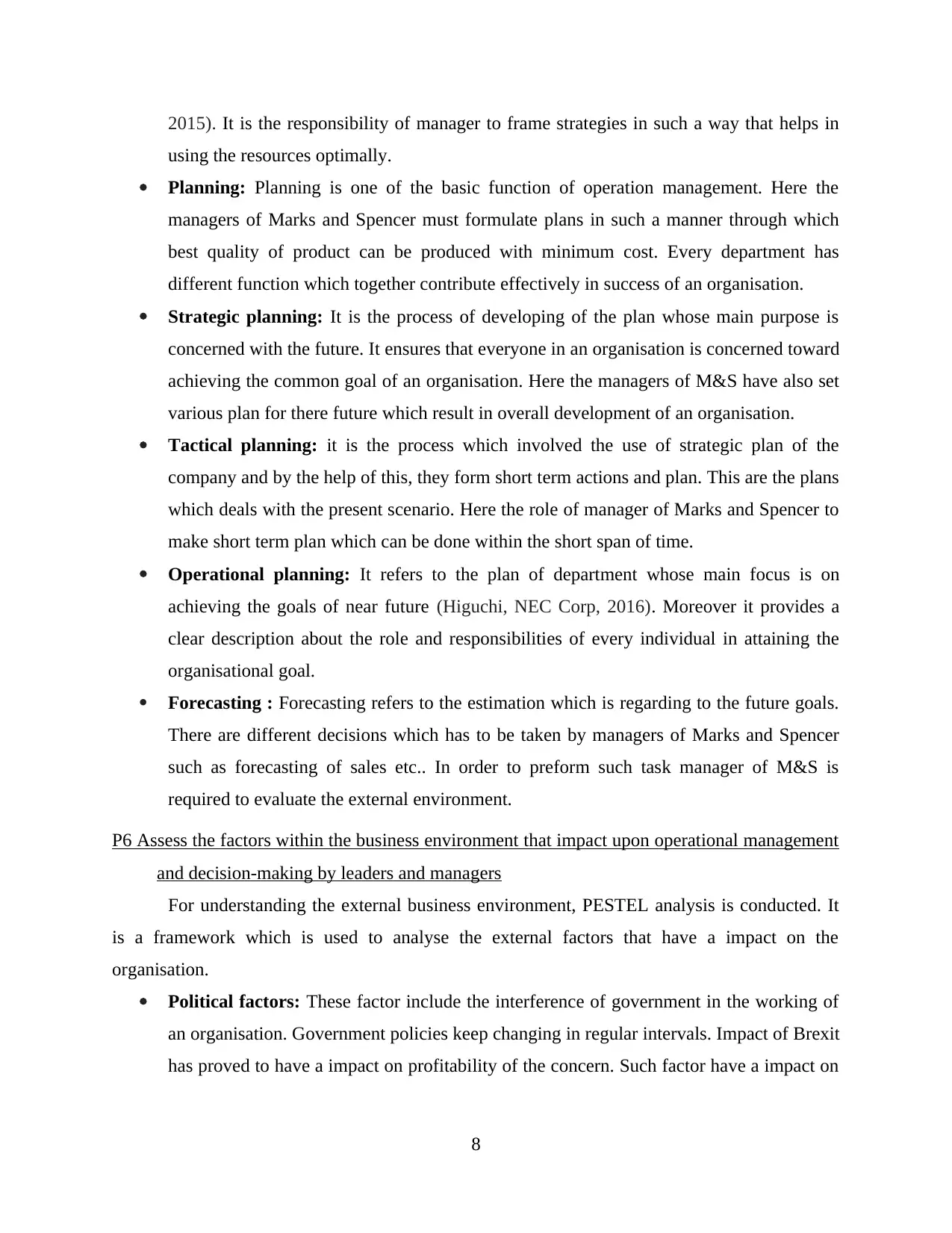
2015). It is the responsibility of manager to frame strategies in such a way that helps in
using the resources optimally.
Planning: Planning is one of the basic function of operation management. Here the
managers of Marks and Spencer must formulate plans in such a manner through which
best quality of product can be produced with minimum cost. Every department has
different function which together contribute effectively in success of an organisation.
Strategic planning: It is the process of developing of the plan whose main purpose is
concerned with the future. It ensures that everyone in an organisation is concerned toward
achieving the common goal of an organisation. Here the managers of M&S have also set
various plan for there future which result in overall development of an organisation.
Tactical planning: it is the process which involved the use of strategic plan of the
company and by the help of this, they form short term actions and plan. This are the plans
which deals with the present scenario. Here the role of manager of Marks and Spencer to
make short term plan which can be done within the short span of time.
Operational planning: It refers to the plan of department whose main focus is on
achieving the goals of near future (Higuchi, NEC Corp, 2016). Moreover it provides a
clear description about the role and responsibilities of every individual in attaining the
organisational goal.
Forecasting : Forecasting refers to the estimation which is regarding to the future goals.
There are different decisions which has to be taken by managers of Marks and Spencer
such as forecasting of sales etc.. In order to preform such task manager of M&S is
required to evaluate the external environment.
P6 Assess the factors within the business environment that impact upon operational management
and decision-making by leaders and managers
For understanding the external business environment, PESTEL analysis is conducted. It
is a framework which is used to analyse the external factors that have a impact on the
organisation.
Political factors: These factor include the interference of government in the working of
an organisation. Government policies keep changing in regular intervals. Impact of Brexit
has proved to have a impact on profitability of the concern. Such factor have a impact on
8
using the resources optimally.
Planning: Planning is one of the basic function of operation management. Here the
managers of Marks and Spencer must formulate plans in such a manner through which
best quality of product can be produced with minimum cost. Every department has
different function which together contribute effectively in success of an organisation.
Strategic planning: It is the process of developing of the plan whose main purpose is
concerned with the future. It ensures that everyone in an organisation is concerned toward
achieving the common goal of an organisation. Here the managers of M&S have also set
various plan for there future which result in overall development of an organisation.
Tactical planning: it is the process which involved the use of strategic plan of the
company and by the help of this, they form short term actions and plan. This are the plans
which deals with the present scenario. Here the role of manager of Marks and Spencer to
make short term plan which can be done within the short span of time.
Operational planning: It refers to the plan of department whose main focus is on
achieving the goals of near future (Higuchi, NEC Corp, 2016). Moreover it provides a
clear description about the role and responsibilities of every individual in attaining the
organisational goal.
Forecasting : Forecasting refers to the estimation which is regarding to the future goals.
There are different decisions which has to be taken by managers of Marks and Spencer
such as forecasting of sales etc.. In order to preform such task manager of M&S is
required to evaluate the external environment.
P6 Assess the factors within the business environment that impact upon operational management
and decision-making by leaders and managers
For understanding the external business environment, PESTEL analysis is conducted. It
is a framework which is used to analyse the external factors that have a impact on the
organisation.
Political factors: These factor include the interference of government in the working of
an organisation. Government policies keep changing in regular intervals. Impact of Brexit
has proved to have a impact on profitability of the concern. Such factor have a impact on
8
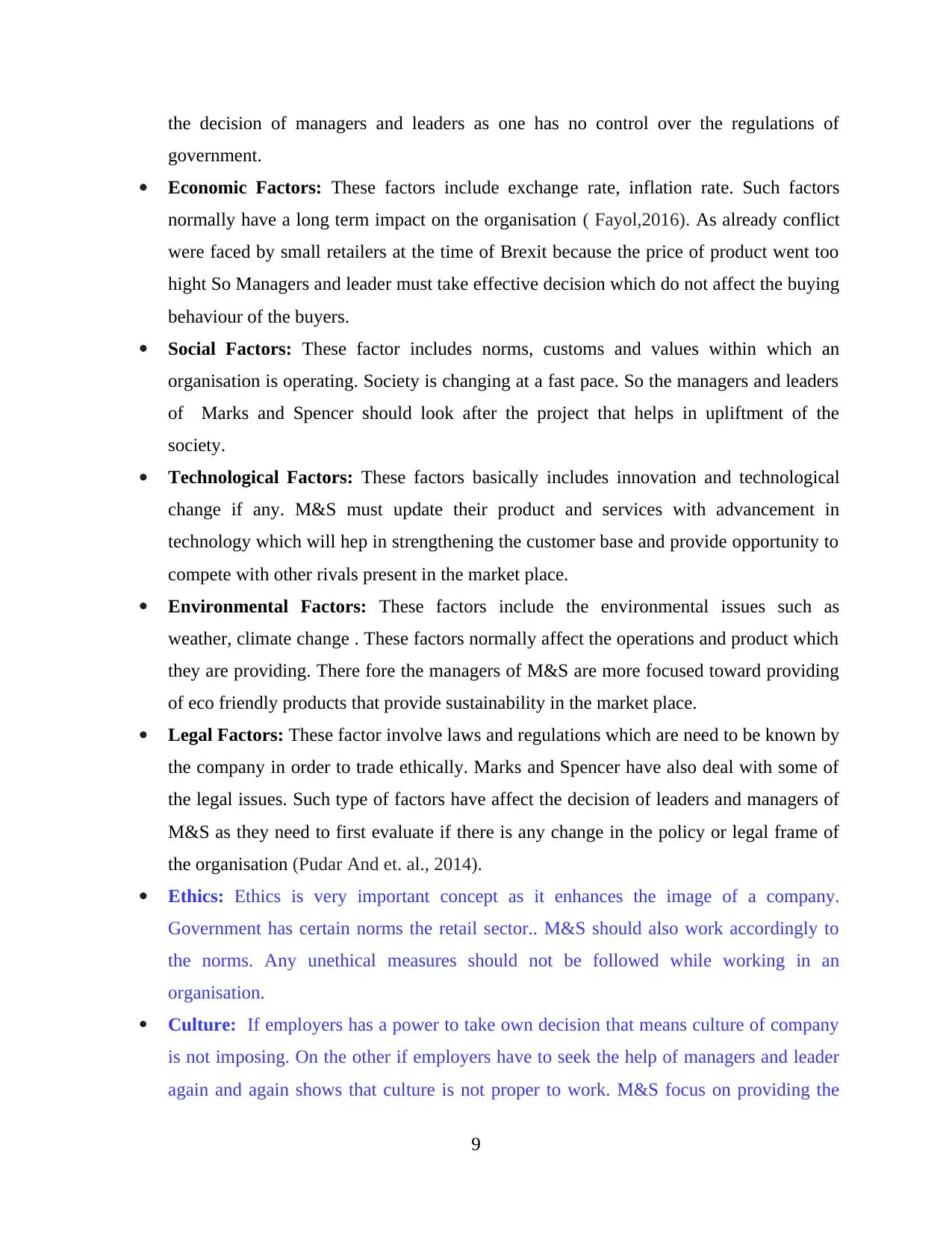
the decision of managers and leaders as one has no control over the regulations of
government.
Economic Factors: These factors include exchange rate, inflation rate. Such factors
normally have a long term impact on the organisation ( Fayol,2016). As already conflict
were faced by small retailers at the time of Brexit because the price of product went too
hight So Managers and leader must take effective decision which do not affect the buying
behaviour of the buyers.
Social Factors: These factor includes norms, customs and values within which an
organisation is operating. Society is changing at a fast pace. So the managers and leaders
of Marks and Spencer should look after the project that helps in upliftment of the
society.
Technological Factors: These factors basically includes innovation and technological
change if any. M&S must update their product and services with advancement in
technology which will hep in strengthening the customer base and provide opportunity to
compete with other rivals present in the market place.
Environmental Factors: These factors include the environmental issues such as
weather, climate change . These factors normally affect the operations and product which
they are providing. There fore the managers of M&S are more focused toward providing
of eco friendly products that provide sustainability in the market place.
Legal Factors: These factor involve laws and regulations which are need to be known by
the company in order to trade ethically. Marks and Spencer have also deal with some of
the legal issues. Such type of factors have affect the decision of leaders and managers of
M&S as they need to first evaluate if there is any change in the policy or legal frame of
the organisation (Pudar And et. al., 2014).
Ethics: Ethics is very important concept as it enhances the image of a company.
Government has certain norms the retail sector.. M&S should also work accordingly to
the norms. Any unethical measures should not be followed while working in an
organisation.
Culture: If employers has a power to take own decision that means culture of company
is not imposing. On the other if employers have to seek the help of managers and leader
again and again shows that culture is not proper to work. M&S focus on providing the
9
government.
Economic Factors: These factors include exchange rate, inflation rate. Such factors
normally have a long term impact on the organisation ( Fayol,2016). As already conflict
were faced by small retailers at the time of Brexit because the price of product went too
hight So Managers and leader must take effective decision which do not affect the buying
behaviour of the buyers.
Social Factors: These factor includes norms, customs and values within which an
organisation is operating. Society is changing at a fast pace. So the managers and leaders
of Marks and Spencer should look after the project that helps in upliftment of the
society.
Technological Factors: These factors basically includes innovation and technological
change if any. M&S must update their product and services with advancement in
technology which will hep in strengthening the customer base and provide opportunity to
compete with other rivals present in the market place.
Environmental Factors: These factors include the environmental issues such as
weather, climate change . These factors normally affect the operations and product which
they are providing. There fore the managers of M&S are more focused toward providing
of eco friendly products that provide sustainability in the market place.
Legal Factors: These factor involve laws and regulations which are need to be known by
the company in order to trade ethically. Marks and Spencer have also deal with some of
the legal issues. Such type of factors have affect the decision of leaders and managers of
M&S as they need to first evaluate if there is any change in the policy or legal frame of
the organisation (Pudar And et. al., 2014).
Ethics: Ethics is very important concept as it enhances the image of a company.
Government has certain norms the retail sector.. M&S should also work accordingly to
the norms. Any unethical measures should not be followed while working in an
organisation.
Culture: If employers has a power to take own decision that means culture of company
is not imposing. On the other if employers have to seek the help of managers and leader
again and again shows that culture is not proper to work. M&S focus on providing the
9
⊘ This is a preview!⊘
Do you want full access?
Subscribe today to unlock all pages.

Trusted by 1+ million students worldwide
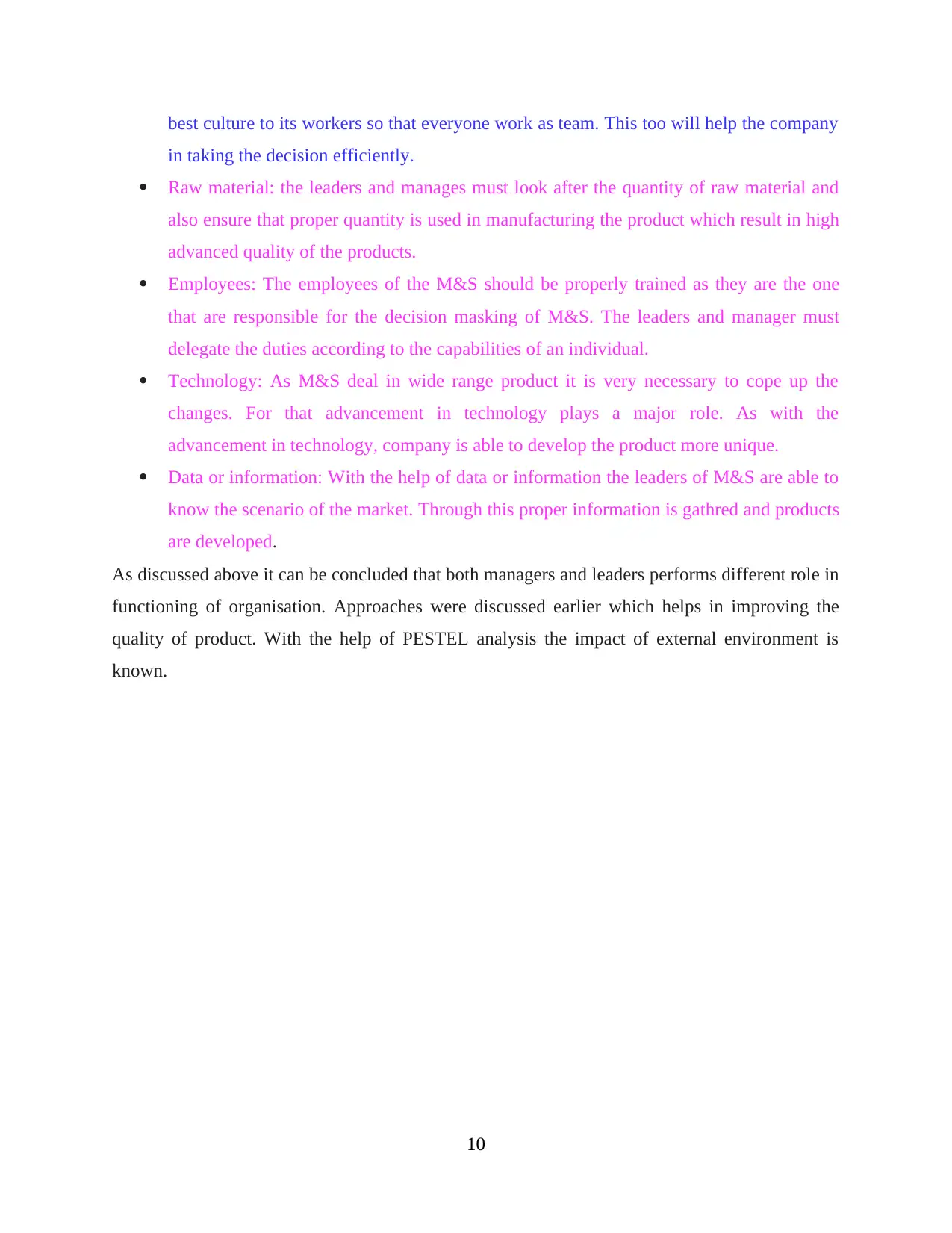
best culture to its workers so that everyone work as team. This too will help the company
in taking the decision efficiently.
Raw material: the leaders and manages must look after the quantity of raw material and
also ensure that proper quantity is used in manufacturing the product which result in high
advanced quality of the products.
Employees: The employees of the M&S should be properly trained as they are the one
that are responsible for the decision masking of M&S. The leaders and manager must
delegate the duties according to the capabilities of an individual.
Technology: As M&S deal in wide range product it is very necessary to cope up the
changes. For that advancement in technology plays a major role. As with the
advancement in technology, company is able to develop the product more unique.
Data or information: With the help of data or information the leaders of M&S are able to
know the scenario of the market. Through this proper information is gathred and products
are developed.
As discussed above it can be concluded that both managers and leaders performs different role in
functioning of organisation. Approaches were discussed earlier which helps in improving the
quality of product. With the help of PESTEL analysis the impact of external environment is
known.
10
in taking the decision efficiently.
Raw material: the leaders and manages must look after the quantity of raw material and
also ensure that proper quantity is used in manufacturing the product which result in high
advanced quality of the products.
Employees: The employees of the M&S should be properly trained as they are the one
that are responsible for the decision masking of M&S. The leaders and manager must
delegate the duties according to the capabilities of an individual.
Technology: As M&S deal in wide range product it is very necessary to cope up the
changes. For that advancement in technology plays a major role. As with the
advancement in technology, company is able to develop the product more unique.
Data or information: With the help of data or information the leaders of M&S are able to
know the scenario of the market. Through this proper information is gathred and products
are developed.
As discussed above it can be concluded that both managers and leaders performs different role in
functioning of organisation. Approaches were discussed earlier which helps in improving the
quality of product. With the help of PESTEL analysis the impact of external environment is
known.
10
Paraphrase This Document
Need a fresh take? Get an instant paraphrase of this document with our AI Paraphraser
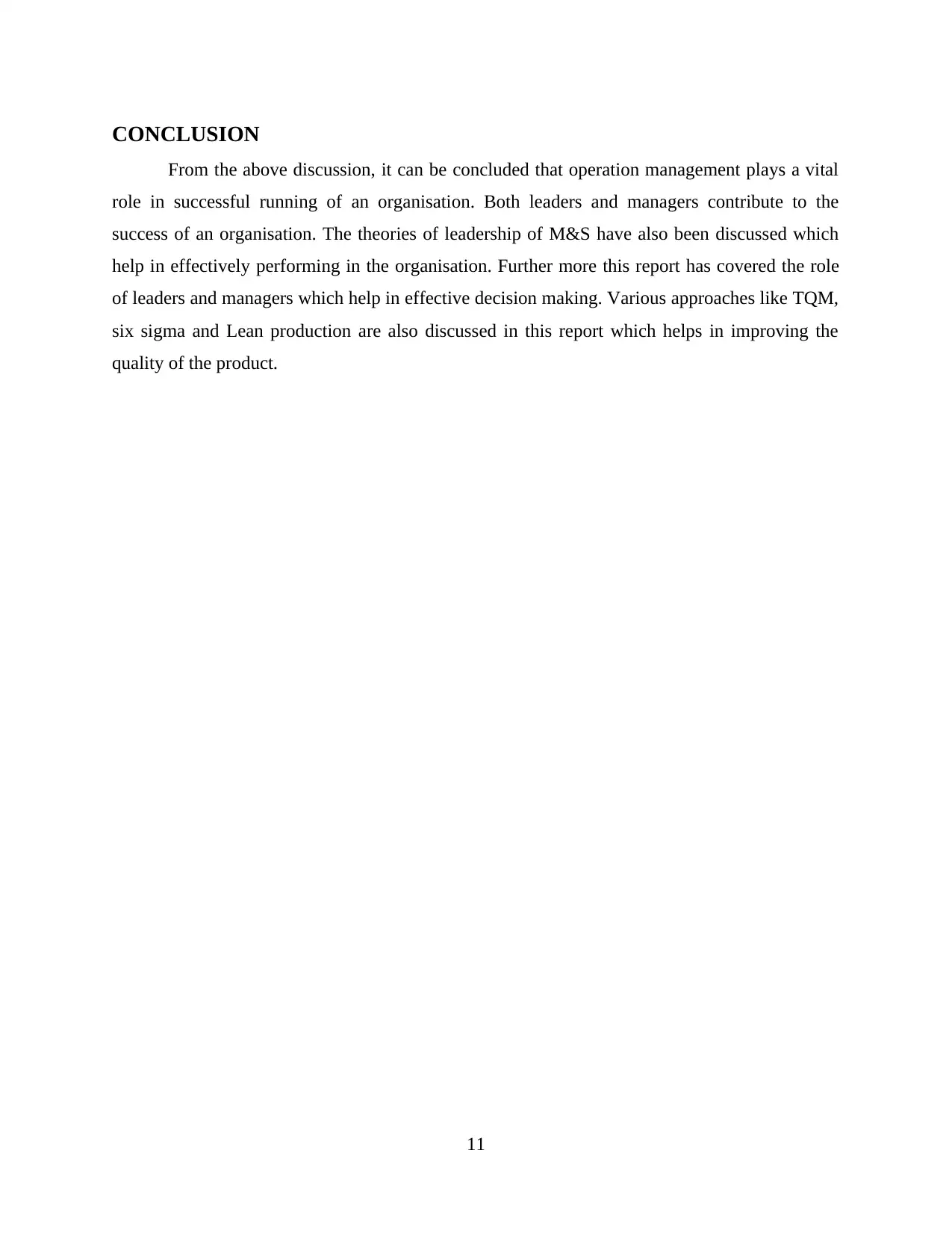
CONCLUSION
From the above discussion, it can be concluded that operation management plays a vital
role in successful running of an organisation. Both leaders and managers contribute to the
success of an organisation. The theories of leadership of M&S have also been discussed which
help in effectively performing in the organisation. Further more this report has covered the role
of leaders and managers which help in effective decision making. Various approaches like TQM,
six sigma and Lean production are also discussed in this report which helps in improving the
quality of the product.
11
From the above discussion, it can be concluded that operation management plays a vital
role in successful running of an organisation. Both leaders and managers contribute to the
success of an organisation. The theories of leadership of M&S have also been discussed which
help in effectively performing in the organisation. Further more this report has covered the role
of leaders and managers which help in effective decision making. Various approaches like TQM,
six sigma and Lean production are also discussed in this report which helps in improving the
quality of the product.
11
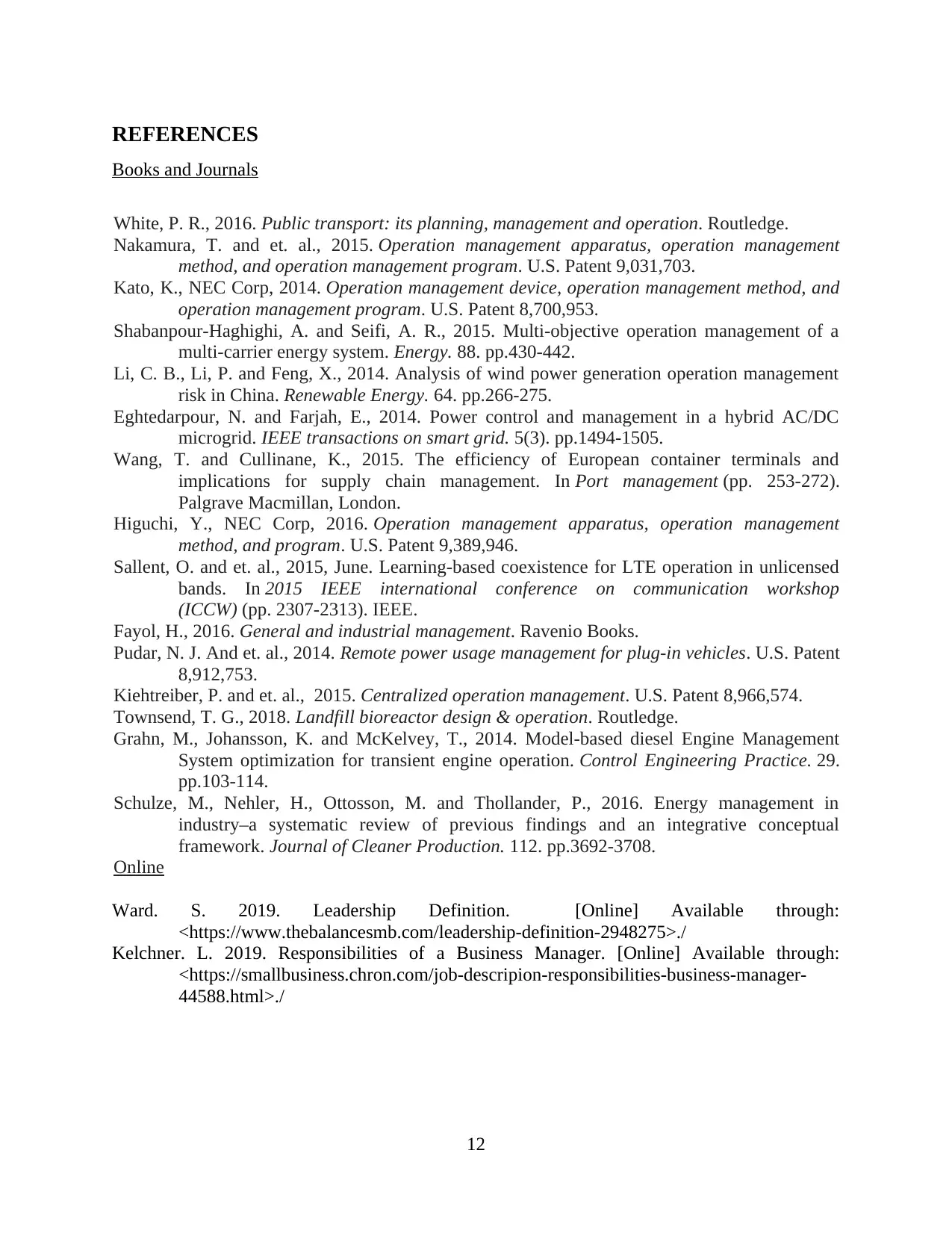
REFERENCES
Books and Journals
White, P. R., 2016. Public transport: its planning, management and operation. Routledge.
Nakamura, T. and et. al., 2015. Operation management apparatus, operation management
method, and operation management program. U.S. Patent 9,031,703.
Kato, K., NEC Corp, 2014. Operation management device, operation management method, and
operation management program. U.S. Patent 8,700,953.
Shabanpour-Haghighi, A. and Seifi, A. R., 2015. Multi-objective operation management of a
multi-carrier energy system. Energy. 88. pp.430-442.
Li, C. B., Li, P. and Feng, X., 2014. Analysis of wind power generation operation management
risk in China. Renewable Energy. 64. pp.266-275.
Eghtedarpour, N. and Farjah, E., 2014. Power control and management in a hybrid AC/DC
microgrid. IEEE transactions on smart grid. 5(3). pp.1494-1505.
Wang, T. and Cullinane, K., 2015. The efficiency of European container terminals and
implications for supply chain management. In Port management (pp. 253-272).
Palgrave Macmillan, London.
Higuchi, Y., NEC Corp, 2016. Operation management apparatus, operation management
method, and program. U.S. Patent 9,389,946.
Sallent, O. and et. al., 2015, June. Learning-based coexistence for LTE operation in unlicensed
bands. In 2015 IEEE international conference on communication workshop
(ICCW) (pp. 2307-2313). IEEE.
Fayol, H., 2016. General and industrial management. Ravenio Books.
Pudar, N. J. And et. al., 2014. Remote power usage management for plug-in vehicles. U.S. Patent
8,912,753.
Kiehtreiber, P. and et. al., 2015. Centralized operation management. U.S. Patent 8,966,574.
Townsend, T. G., 2018. Landfill bioreactor design & operation. Routledge.
Grahn, M., Johansson, K. and McKelvey, T., 2014. Model-based diesel Engine Management
System optimization for transient engine operation. Control Engineering Practice. 29.
pp.103-114.
Schulze, M., Nehler, H., Ottosson, M. and Thollander, P., 2016. Energy management in
industry–a systematic review of previous findings and an integrative conceptual
framework. Journal of Cleaner Production. 112. pp.3692-3708.
Online
Ward. S. 2019. Leadership Definition. [Online] Available through:
<https://www.thebalancesmb.com/leadership-definition-2948275>./
Kelchner. L. 2019. Responsibilities of a Business Manager. [Online] Available through:
<https://smallbusiness.chron.com/job-descripion-responsibilities-business-manager-
44588.html>./
12
Books and Journals
White, P. R., 2016. Public transport: its planning, management and operation. Routledge.
Nakamura, T. and et. al., 2015. Operation management apparatus, operation management
method, and operation management program. U.S. Patent 9,031,703.
Kato, K., NEC Corp, 2014. Operation management device, operation management method, and
operation management program. U.S. Patent 8,700,953.
Shabanpour-Haghighi, A. and Seifi, A. R., 2015. Multi-objective operation management of a
multi-carrier energy system. Energy. 88. pp.430-442.
Li, C. B., Li, P. and Feng, X., 2014. Analysis of wind power generation operation management
risk in China. Renewable Energy. 64. pp.266-275.
Eghtedarpour, N. and Farjah, E., 2014. Power control and management in a hybrid AC/DC
microgrid. IEEE transactions on smart grid. 5(3). pp.1494-1505.
Wang, T. and Cullinane, K., 2015. The efficiency of European container terminals and
implications for supply chain management. In Port management (pp. 253-272).
Palgrave Macmillan, London.
Higuchi, Y., NEC Corp, 2016. Operation management apparatus, operation management
method, and program. U.S. Patent 9,389,946.
Sallent, O. and et. al., 2015, June. Learning-based coexistence for LTE operation in unlicensed
bands. In 2015 IEEE international conference on communication workshop
(ICCW) (pp. 2307-2313). IEEE.
Fayol, H., 2016. General and industrial management. Ravenio Books.
Pudar, N. J. And et. al., 2014. Remote power usage management for plug-in vehicles. U.S. Patent
8,912,753.
Kiehtreiber, P. and et. al., 2015. Centralized operation management. U.S. Patent 8,966,574.
Townsend, T. G., 2018. Landfill bioreactor design & operation. Routledge.
Grahn, M., Johansson, K. and McKelvey, T., 2014. Model-based diesel Engine Management
System optimization for transient engine operation. Control Engineering Practice. 29.
pp.103-114.
Schulze, M., Nehler, H., Ottosson, M. and Thollander, P., 2016. Energy management in
industry–a systematic review of previous findings and an integrative conceptual
framework. Journal of Cleaner Production. 112. pp.3692-3708.
Online
Ward. S. 2019. Leadership Definition. [Online] Available through:
<https://www.thebalancesmb.com/leadership-definition-2948275>./
Kelchner. L. 2019. Responsibilities of a Business Manager. [Online] Available through:
<https://smallbusiness.chron.com/job-descripion-responsibilities-business-manager-
44588.html>./
12
⊘ This is a preview!⊘
Do you want full access?
Subscribe today to unlock all pages.

Trusted by 1+ million students worldwide
1 out of 15
Related Documents
Your All-in-One AI-Powered Toolkit for Academic Success.
+13062052269
info@desklib.com
Available 24*7 on WhatsApp / Email
![[object Object]](/_next/static/media/star-bottom.7253800d.svg)
Unlock your academic potential
© 2024 | Zucol Services PVT LTD | All rights reserved.





